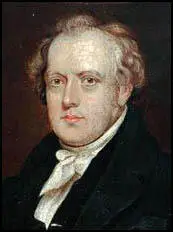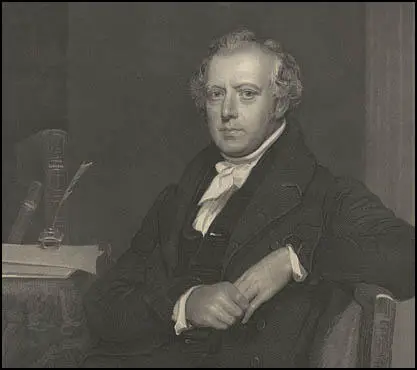Richard Oastler

Richard Oastler, the son of a clothing merchant, was born in Leeds on 20th December, 1789. Richard attended a Moravian boarding school from 1798 to 1810 and became a commission agent. Oaster did this job for ten years and in 1820 was appointed as steward for Thomas Thornhill, the absentee landlord of Fixby, a large estate near Huddersfield.
In 1830 Oastler met John Wood, a worsted manufacturer from Bradford, who agonised over the need to employ children in his factory. After a lengthy meeting Oastler decided to join the struggle for factory legislation.
Unlike most of the people in the factory reform movement, Oastler was a supporter of the Tory Party. He strongly opposed universal suffrage, trade unions and was a warm supporter of the rigid class structure of the early 19th century. However, Oastler believed it was the responsibility of the ruling class to protect the weak and vulnerable. For example, Oastler thought the 1834 Poor Law was too harsh and campaigned for it to be reformed.
Oastler thought the best way to protect children was to obtain a maximum ten hour day. He argued: "Very often the children are awakened by the parents at four in the morning. They are pulled out of bed when almost asleep. The younger children are carried on the backs of the older children asleep to the mill, and they see no more of their parents till they go home at night, and are sent to bed."
On 29th September 1830, Oastler wrote a letter to the Leeds Mercury attacking the employment of young children in textile factories. John Hobhouse, the Radical M.P. read the letter and decided to introduce a bill restricting child labour. Hobhouse proposed that: (a) no child should work in a factory before the age of 9; (b) no one between the ages of 9 and 18 should work for more than twelve hours; (c) no one aged between the ages of 9 and 18 should work for more than 66 hours a week; (d) no one under 18 should be allowed to do night work.

After details of Hobhouse's Bill was published, workers began forming what became known as Short Time Committees in an effort to help promote its passage through Parliament. The first Short Time Committees were formed in Huddersfield and Leeds but within a few months, with the help of Richard Oastler, they were established in most of the major textile towns.
Parliament was dissolved in April, 1831 and so Hobhouse's Bill had to be reintroduced after the General Election. Hobhouse's proposals for factory legislation were discussed in Parliament in September 1831. Richard Oastler and the Short Time Committees were furious when Hobhouse agreed to make changes to his proposals. Although Hobhouse's Bill was passed it only applied to cotton factories and failed to provide any machinery for its enforcement.
Unhappy with what Hobhouse had achieved, the Short Time Committees continued to work for factory legislation. A magnificent orator, Richard Oastler soon became leader of what was now known as the Ten Hour Movement.
In 1836 Oastler began advocating workers to use strikes and sabotage in their campaign for factory legislation and changes in the poor law. When Thomas Thornhill heard about this he sacked Oastler from his post as steward of Fixby. He also began legal proceedings against Oastler for unpaid debts. Unable to pay back the money he owed, Oastler was jailed for debt in December 1840. His friends began raising money to help him but it was not until February 1844 that the debt was paid and Oastler was released from Fleet Prison. Once released, Oastler returned to his campaign for the ten hour day.
In 1847, Parliament passed an act that stated that children between 13 and 18 and women were not to work for more than ten hours a day and 58 hours a week. However, the 1847 Factory Act only applied to parts of the textile industry. It was not until 1867, six years after the death of Richard Oastler, that the existing Factory Acts applied to all places of manufacturing.
Primary Sources
(1) Richard Oastler describing a meeting with John Wood, a factory owner from Bradford, in September 1830.
John Wood turned towards me, reaching out his hand and in the most impressive manner pressed my hand in his said: "I have had no sleep tonight. I have been reading the Bible and in every page I have read my own condemnation. I cannot allow you to leave me without a pledge that you will use all your influence in trying to remove from our factory system the cruelties which are practised in our mills." I promised I would do what I could. I felt that we were each of us in the presence of the Highest and I knew that that vow was recorded in Heaven.
(2) Richard Oastler, speech on 7th July, 1832.
Very often the children are awakened by the parents at four in the morning. They are pulled out of bed when almost asleep. The younger children are carried on the backs of the older children asleep to the mill, and they see no more of their parents till they go home at night, and are sent to bed.
(3) Richard Oastler, letter published in the Bradford Observer (17th July, 1834)
The mill-owners obtained their wealth by overworking and by defrauding the factory children. They were praying people, but took care their work people should neither have time nor strength to pray. These hypocrites pretended it was necessary to keep these poor infant slaves at this excruciating labour just to preserve them from "bad company" and to prevent them learning "bad habits".

